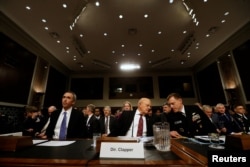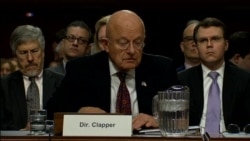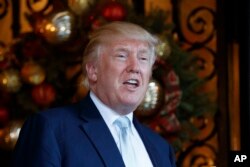United States intelligence leaders say they believe high-level Russian officials were directly responsible for attacking American computers during the 2016 election campaign.
The intelligence leaders met with a U.S. Senate Committee in Washington Thursday. They said that Russia hacked the computers and released documents from the Democratic National Committee (DNC) in an effort to interfere in the presidential election.
Only “Russia's senior-most officials could have authorized the recent election-focused data thefts and disclosures,” they said in a prepared statement.
The U.S. leaders are Director of National Intelligence James Clapper, National Security Agency chief Michael Rogers and Undersecretary of Defense for Intelligence Marcel Lettre. They called Russian cyber-attacks a "major threat" to national interests.
WATCH: Clapper on Russia hacking
Clapper said there is no evidence that Russia actually changed any vote counts. He said the intelligence agencies are unable to say how the information might have changed any American minds or votes.
Arizona’s John McCain, chairman of the Senate Armed Services Committee, told the hearing that “every American should be alarmed” by Russia’s actions. He added that “Congress must set partisanship aside” in investigating and preventing cyber-attacks on America.
On Wednesday, McCain called the Russian interference “an act of war.”
WATCH: McCain on Russia hacking
“I’m not saying it’s an atomic attack,” he said. “I’m just saying that when you attack a nation’s fundamental structure, which they are doing, then it’s an act of war.”
Evidence of Russian hacking
U.S. intelligence agencies have said they have evidence that Russia hacked the emails of Democratic Party officials. Critics say the hacking was meant to help Donald Trump, the candidate of the Republican Party, win the presidential election.
But President-elect Donald Trump has questioned those claims.
On Thursday, President Barack Obama received a report on the investigation he ordered into the possible foreign interference in the election. Trump is expected to receive the same information in a briefing in New York City on Friday.
The president-elect has questioned reports that Russia interfered in the vote. He took to Twitter late Tuesday, taking aim at the intelligence agencies.
Trump suggested they still do not have proof that Russia broke into the DNC’s computers and gave the documents to the WikiLeaks website.
Can Julian Assange Be Trusted?
WikiLeaks founder Julian Assange has denied that the Russian government gave his group stolen documents. He appeared on Fox News television earlier this week.
On Wednesday, Trump tweeted this message: “Julian Assange said ‘a 14 year old could have hacked Podesta’ - why was DNC so careless?”
Trump was talking about thousands of emails and documents that hackers took from the DNC’s computers and from John Podesta, the chief of Hillary Clinton’s election campaign.
On Thursday, Trump fired back at critics on Twitter: “The dishonest media likes saying that I am in Agreement with Julian Assange - wrong. I simply state what he states, it is for the people to make up their own minds as to the truth. The media lies to make it look like I am against ‘Intelligence’ when in fact I am a big fan!”
Clapper and other intelligence officials told the Senate committee Thursday that they put no credibility into what Assange says.
US-Russia relationship
Ukrainian political scientist Lilia Shevtsova is an expert on Russian government. She told VOA that some foreign policy experts in Russia are calling for increased communication between it and the United States. She said Obama moved toward such a policy in 2008 when Dmitry Medvedev was Russia’s president. But she said the effort failed.
Shevtsova said Russian experts continue to call for increased communication.
Valery Garbuzov is the director of the Russian Academy of Sciences’ Institute for U.S. and Canadian Studies. He told VOA that many Russians are hopeful that Trump’s presidency will lead to improved relations between the two countries.
Garbuzov said he is not sure Trump will be able to quickly improve U.S. relations with Russia.
I’m Anne Ball.
And I’m Dan Friedell.
Anne Ball wrote this story for VOANews.com. Her story was based on reports from VOANews.com, the Associated Press and Reuters. George Grow was the editor.
We want to hear from you. Write to us in the Comments Section and visit us on our Facebook page.
______________________________________________________________
Words in This Story
hacked – v. use of a computer to break into data in a system
disclosure – n. the act of making something known
partisanship – n. a person who strongly supports a particular leader, political party or cause
reliance – n. the state of needing someone or something for help, support, etc.
credibility - n. the quality of being believed or accepted as true, real, or honest









